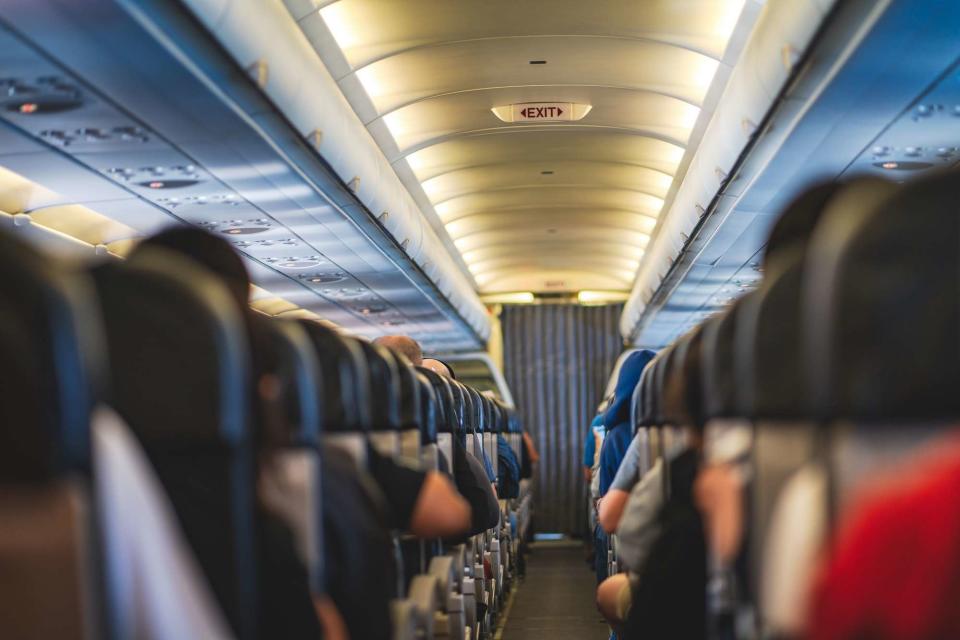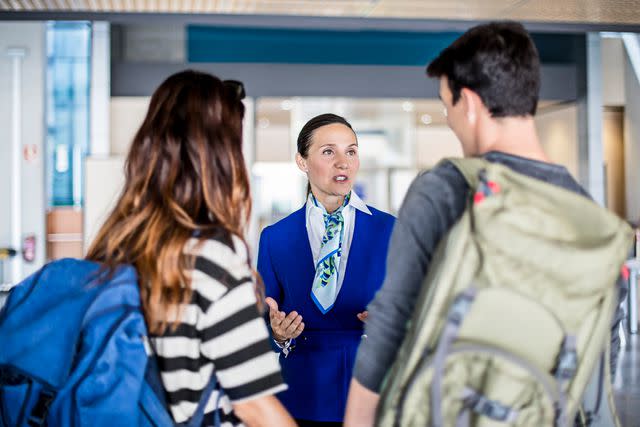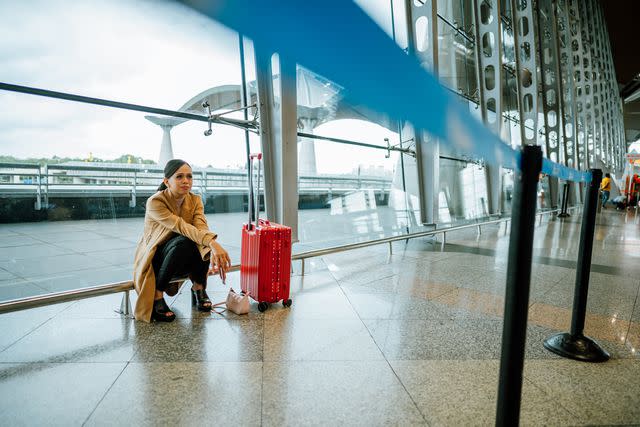What to Do If Your Flight Is Overbooked — Including How to Claim Compensation
Don't panic — your airline must still get you to your final destination, and you may come away with a reasonable compensation package.

Natnan Srisuwan/Getty Images
Imagine this: You arrive at the airport, ready to kick off your vacation — but not so fast. You’re now being told your flight is overbooked, and you can’t get on the plane. What gives?
As surprising as it may seem, flight overbooking is extremely common in the U.S. Most airlines sell more tickets for a flight than there are available seats on the aircraft because they anticipate some passengers may cancel their reservations, miss their flights, or change their travel plans at the last minute. By overbooking, airlines aim to maximize their revenue and fill as many seats as possible on each flight, thus increasing profitability.
While overbooking can be financially beneficial for airlines, it can also lead to situations where there are more passengers with valid reservations than there are seats on the plane. In such cases, airlines must ask for volunteers to give up their seats in exchange for compensation, which can include things like meal vouchers, cash, or credit for a future flight. If there are not enough volunteers, airlines may involuntarily deny boarding to some passengers. Of course, this usually leads to angry passengers, but it can also result in compensation for those passengers and/or legal issues for the airline if they don't follow federal regulations.
Read on to learn more about overbooking and how to avoid it (or, at the very least, benefit from it).

Xavier Arnau/Getty Images
Why do airlines overbook flights?
Airlines overbook flights to optimize seat occupancy and revenue. They anticipate some passengers will cancel their reservations or not show up, allowing them to fill as many seats as possible. This practice helps airlines maximize profitability by reducing the financial impact of empty seats caused by last-minute changes in travel plans.
“Airlines usually pay careful attention to each of their routes’ statistics and only sell as many extra seats as are likely to become available,” Eric Napoli, the vice president of legal strategy at AirHelp, tells Travel + Leisure. “However, they don’t always get it right, which may result in passengers with valid tickets being denied boarding, and the airline will have to compensate the passengers for bumping them from the flight.”
Who gets bumped on an overbooked flight?
On an overbooked flight, airlines first seek volunteers to give up their seats — often with the incentive of flight credit — before resorting to involuntary bumping. But if no volunteers step forward, the airline typically determines the passengers who get bumped based on established criteria, including check-in time, fare class, and frequent flier status.
“The process of selection is generally random. However, airlines might prefer to start the process from the pool of passengers who do not have any loyalty status,” says Anton Radchenko, founder of Boston-based AirAdvisor.
It's essential to note these criteria should not unfairly discriminate against passengers, and the Department of Transportation (DOT) has regulations to ensure everyone is treated fairly and not subjected to unjust prejudice or disadvantage based on factors like race or ethnicity.
“In the U.S., some airlines try to avoid bumping passengers with a special status, like veterans or disabled passengers,” adds Radchenko. “This, of course, follows standard announcements to invite volunteers to give up seats for a fraction of compensation, typically offered in miles and an extra ticket."
How can I volunteer to get bumped?
Before involuntarily bumping passengers, most airlines make announcements at the gate seeking volunteers to take a later flight, offering them compensation in exchange. These offers can sometimes be quite lucrative, so if your travel plans are flexible, take note.
Compensation can vary, but perks commonly include a flight credit, cash, and meal vouchers. For instance, an airline might offer a travel voucher worth a few hundred dollars, a meal voucher for use at the airport, and a seat on the next available flight to your destination. Some airlines may offer even more substantial compensation, especially if the flight is significantly overbooked or the next available flight isn't until the next day — in that case, a compensation package may include a hotel booking.
When volunteering, clarifying the compensation package and the next available flight is advisable to ensure it aligns with your preferences and schedule. Compensation is negotiable, so don't be afraid to ask for dollar amounts, specific flights (and even upgrades), or extras like lounge passes.

simon2579/Getty Images
What should I do if I get bumped?
If you are involuntarily bumped from your flight departing from the U.S., don’t lose hope — in most cases, you’re entitled to compensation, and the airline will still assist you with getting to your destination. There are exceptions, however, including bumping due to aircraft changes when your new plane may have fewer seats than your original one.
But you may be involuntarily bumped on an eligible flight. "You’re entitled to cash, so don’t feel obligated to accept travel vouchers or any other alternative forms of compensation," says Napoli. "In fact, accepting vouchers can make you ineligible for additional compensation."
“Giving up the seat involuntarily is referred to as ‘denied boarding,’ and the law provides for a compensation ranging from $675 to $1,350, which depends on delay upon arrival at your destination,” says Radchenko. This is in addition to the airline rebooking you on the next available flight.
Radchenko advises bumped passengers to ask the gate agent for a denied boarding form. "This form is important evidence to prove that denied boarding has actually occurred to you and impacted your travel," he says. "Unlike other flight disruptions where other evidence can be obtained from other sources, denied boarding cannot be proved without it.”
In some cases, the airline may make a compensation package offer that exceeds the cash option, including a flight credit, meal vouchers, and a hotel booking if you have to wait for a later flight. "If the airline makes a compelling enough offer, you may prefer to take it. The final decision is up to you," says Napoli. Just keep in mind credits and vouchers expire, so the cash offer may be a better value depending on your future travel plans.
If you believe the compensation offered is insufficient, or you encounter any issues, politely discuss your concerns with the airline staff or contact the airline's customer service for further assistance.
For the federal rules and regulations regarding involuntary bumping, visit transportation.gov.
Does travel insurance cover airline overbooking?
Travel insurance typically doesn’t cover overbooking, as the airlines are responsible for compensation. Still, travel insurance policies may offer some coverage for related issues or disruptions, including trip delays or cancellations.
If you are involuntarily bumped from a flight due to overbooking, your first recourse should be to the airline, but travel insurance will probably come into play if the overbooking leads to a significant delay or cancellation that impacts your travel plans beyond what the airline can address. In that case, your travel insurance policy may cover additional expenses incurred due to the delay, like extra hotels, meals, or alternative transportation to your destination.
For more Travel & Leisure news, make sure to sign up for our newsletter!
Read the original article on Travel & Leisure.

